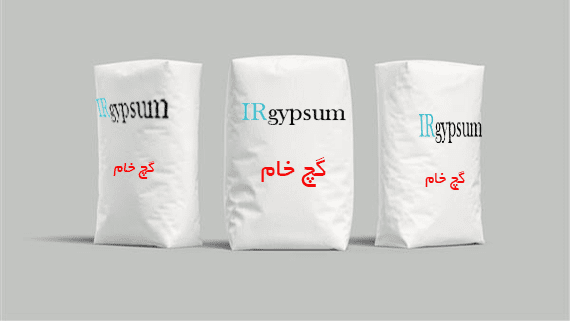
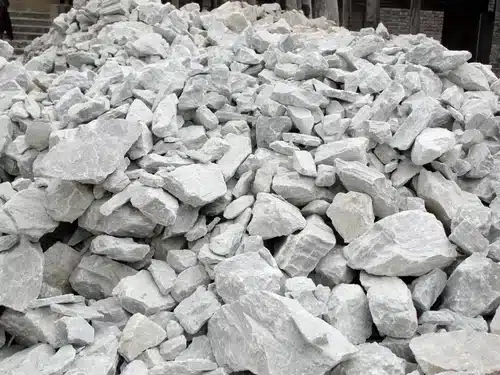
Gypsum Stone (Raw Gypsum)
Gypsum stone, also known by its scientific name Calcium Sulfate Dehydrate (CaSO4.2H2O), is a mineral that is extracted from gypsum mines in various forms. The purity of raw gypsum varies in the extraction process, and in our mining complex, gypsum stones with the highest purity and color quality are selected for processing and consumption. However, in many industries, such high quality and sensitivity are not necessary. The difference in the purity of gypsum stone determines its diverse applications.
Price of Semnan Gypsum Stone
To place a direct order for this stone (raw gypsum) with different purities, you can contact us at +989121319065 or +982333445393. Placing a direct order for this mineral allows you to receive the price of various types of Semnan gypsum stone calculated at the factory gate. We emphasize quality and ensure its sustainability.
It is worth mentioning that other factors affecting the price of raw gypsum stone include the requested grain size and the packaging method.
Semnan gypsum stone complex compared to other mines in Iran and the world
Advantages of Semnan Gypsum Stone Compared to Other Mines in Iran and the World
As mentioned above, raw gypsum mineral has various purities, and its impurities are related to the raw materials mixed with the stone in the mines. The impurities that accompany gypsum during extraction are naturally separable. The key factor that determines the quality of this mineral is the analysis of raw gypsum stone and the presence of different elements in the gypsum stones from different mines.
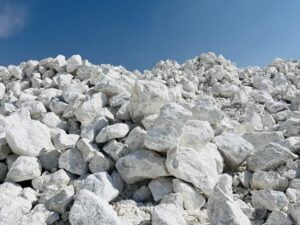
In Semnan Gypsum Stone, another important aspect is the amount of molecular water present in it. The closer the amount of molecular water is to the maximum value, the higher the indication of the stone’s (raw gypsum) quality. The
amount of molecular water is represented by the symbol “loi” in the analysis of raw gypsum stone. The maximum loi value in this stone can be 21, indicating that the raw stone contains 21% molecular water.
The amount of molecular water in the raw gypsum stone of some high-quality mines in Semnan can exceed 20% and sometimes reach up to 20.99%. However, it should be noted that the desired value is usually considered to be between 20% to 21%.
Semnan Gypsum Stone has higher purity and quality compared to other mines in Iran and the world. The impurities in the stone of some high-quality Semnan mines are minimized, and the high quality of this stone (raw gypsum) makes it suitable for use in various industries such as construction, industrial, decorative, agricultural, medical, cosmetics, etc.
Considering the presence of gypsum mines in many regions of Iran and the world, the price of raw gypsum stone depends on its purity, color, and analysis. Different provinces such as Khorasan, Hormozgan, Yazd, Tehran, Azerbaijan, Zanjan, Khuzestan, etc., have gypsum mines that usually do not have the same quality, purity, and color as the Semnan mines. This has contributed to the reputation of Semnan gypsum worldwide.
How to Get Consultation and Analysis of Semnan Gypsum Stone (Raw Gypsum)
If you are interested in purchasing various types of Semnan gypsum stone and seeking consultation regarding its desired purity and applications, you can contact the sales department of the factory at +989121319065 and +982333445393. They will be able to guide you regarding analysis, standards, and related quality tests of the product and provide you with the best price.
Various Applications of Raw Gypsum Stone:
The first application is the export of raw gypsum stone:
This stone is suitable for export as a mineral commodity, either in bulk or packaged in jumbo bags with a specific size (usually five to fifty centimeters). Exporting unprocessed raw gypsum yields less profit, which is why some factories in Iran process this stone and export it alongside domestic consumption. If processing facilities are not available within the country, exporting raw gypsum stone becomes a profitable option.
Exporting gypsum stone provides several advantages such as generating higher profits, accessing international markets, and expanding the reach of gypsum resources.

Next is the application in cement factories:
Gypsum is used as an additive in cement production. Cement hardens rapidly when in contact with water, which can affect its performance. To prevent this issue and modify the particle size of cement in cement factories, gypsum is used. Adding gypsum to cement can significantly improve particle size, setting time, and setting strength.
Control of agricultural water PH:
The PH of water used in agriculture is highly important. This parameter can have a significant impact on plant growth and performance, and an error in PH levels can cause serious damage to farms and agricultural products. Additionally, water PH can alter soil structure and consequently affect agricultural usage. Therefore, adjusting water pH is crucial and can influence agricultural performance and productivity.
Adjustment of agricultural soil pH:
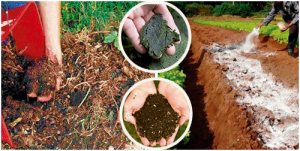
The suitable PH range for plant growth in soil is between 6.5 and 7.5 Raw agricultural gypsum is used to adjust this pH range.
Role of raw gypsum in reducing soil salinity:
In addition to pH adjustment, raw gypsum plays a crucial role in reducing soil salinity. This mineral is used as a suitable solution for reducing soil salinity levels.
Other applications of raw gypsum in agriculture:
However, the agricultural applications of gypsum are not limited to these two cases. Other uses include improving soil structure, increasing soil strength, addressing calcium and sulfur deficiencies in soil, creating porosity and improving soil permeability, enhancing the quality of the final product, absence of adverse effects on soil and plants, aiding in the reduction of toxicity caused by excessive chemical fertilizers, providing oxygen to roots, reducing plant stress, increasing plant productivity, and preventing plant diseases. These applications highlight the importance and extensive use of gypsum in agriculture.
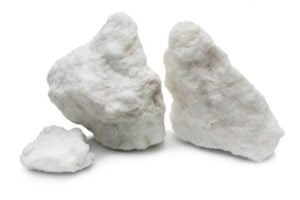
Use in pottery and ceramic industries:
Ground gypsum powder is used in pottery as a raw material for the production of ceramic vessels. In this industry, the color and purity of gypsum are crucial for the composition of raw materials.
Investigating Different Types of Raw Gypsum Stones
Transparent Gypsum Stone (Crystal):
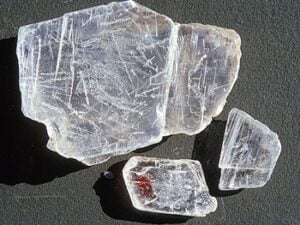
This type of stone, also known as crystal gypsum, has high purity and visual transparency. It is found in specific mines where geological conditions, temperature, and pressure over millions of years have facilitated the formation of this mineral. Due to its rarity and high value, transparent gypsum stone is highly valuable.
Crystalline Gypsum Stone:
This type of raw gypsum stone also forms as thin layers of hydrated calcium sulfate deposits. It is used in various industries, such as the crystal gypsum industry, and is also known as satin spar.
Non-Crystalline Gypsum Stone:
This type of stone is abundantly found in nature and easily extracted, forming a primary material for many factories. After processing in a factory, this mineral can have various applications.
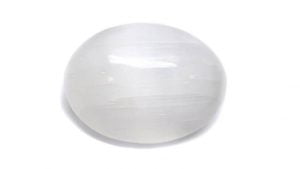
Selenite Stone:
Selenite is another type of raw gypsum stone that has a transparent, beautiful, and glossy appearance. It can be easily cleaved into sheets and is also used in decorative industries. Additionally, it is referred to as a moonstone.
Satin Spar:
This type of raw gypsum stone is found in fibrous or filamentous forms in nature and lacks a laminar structure. Its fibers have high density and create an absorption and refraction effect when light is broken.
Clustered Raw Gypsum:
This type of stone, like satin spar gypsum, is found in fibrous and silky threads.
Marine Glass and Gypsum:
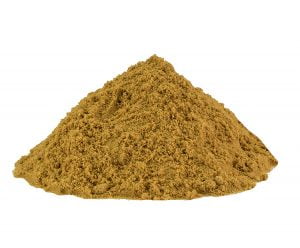
Marl gypsum and other types of gypsum stones are not used in industrial and gypsum production. These stones are found in layered formations that lack sufficient strength for use in the gypsum industry.
As for gypsum, it should be noted that this type of stone is also in a powdered form. It is mixed with clay and compressed into compacted clumps. The clumps of gypsum are usually yellow in color due to the presence of iron oxides, and impurities such as gravel and sand can be found in them. Gypsum is extracted in the form of compacted clumps, which are then transferred to a kiln, sieved, and packaged in gypsum bags. However, due to its low adhesive properties, it is not even recommended for undercoating.
In general, raw gypsum stone can also be found in other forms and configurations. These formations may vary in their geological factors, time, and formation conditions. Raw gypsum is usually found in layers and deposits in nature and undergoes processes such as crushing, calcining, drying, grinding, and grading after extraction, to be used as powder or smaller granules in various industries.
Returning to the initial sentence of the text, it states that the utilization and quality of the extracted stone depend on its purity. Purity, high quality, analysis, and color are characteristics that require visiting certain gypsum mines in Semnan to have all of them.